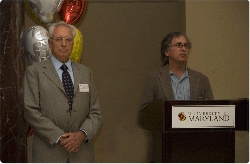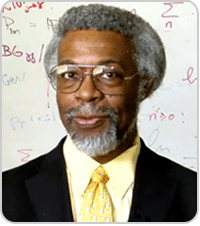Leopoldo García-Colín Scherer Named 2011 Distinguished Alumnus
- Details
- Category: Department News
- Published: Monday, August 01 2011 09:58
Leopoldo García-Colín Scherer was honored with Department’s 2011 Distinguished Alumnus Award. Dr. García-Colín, an expert in mechanical statistics and thermodynamics, received his PhD in 1959, and returned to his native Mexico to lead a distinguished career as a researcher, author and administrator of the Universidad Autónoma Metropolitana.
The Distinguished Alumnus Award was presented on Friday, April 29, 2011 at the Academic Festival hosted by Steve Halperin, Dean of the College of Computer, Mathematical and Physical Sciences.

